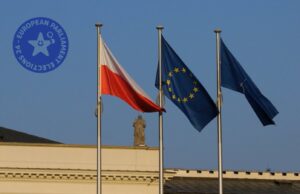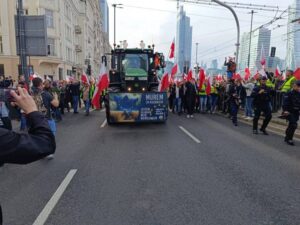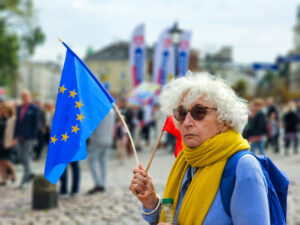Analysis from our member organisation Naprzód on the political landscape in Poland ahead of the European Elections.
Please find here the exclusive announcement of support of the former-MP Anna Grodzka for Lewica-Razem.
The European parliamentary elections in Poland will take place in the run up to the national parliamentary elections which are due to be held in October. This gives them an extra importance as political parties position themselves for these elections in the Autumn. Polish politics continues to be dominated by two parties from the right – the Law and Justice Party (PiS) and Citizens’ Platform (PO). In its attempt to challenge the ruling PiS, PO has widened the coalition it created during last year’s local elections (Citizens’ Coaltion – KO), which has included some different parts of the left. Meanwhile a new liberal left party and left coalition will compete in these elections.
Right-Wing Divisions
Since 2015, Poland has been governed by the right-wing conservative party: PiS. They have introduced a series of controversial reforms of the courts and media. Polish politics has mainly divided between PiS and an movement to these reforms, which has been dominated by PO. Meanwhile PiS has managed to develop a pro-social image for itself after introducing such reforms as new child benefits and an increase in the minimum wage. Therefore the “democratic opposition” has tended to be restricted to the wealthier urban electorate and PiS have maintained the support of those from smaller towns and the countryside.
Issues such as abortion rights and refugees have also been controversial and divisive issues in Polish politics. During the last parliamentary and local election campaigns PiS has deliberately used the issue of not accepting refugees into Poland, as a way of mobilising its conservative electoral base. As we move towards the European elections, PiS has now identified LGBT+ rights as the new issue to exploit, attacking the new Mayor of Warsaw (Rafał Trzaskowski, from PO) for signing an LGBT+ rights declaration. It seems that Polish politics will continue to divide between the liberal and conservative camps during the election campaigns in 2019.
European Issues
The PiS government has conflicted with the European Union over its reforms of the courts, becoming the only country to have had Article 7 triggered against it, which could theoretically result in it losing its voting rights in the EU. However, in recent months the government has made some concessions over its reforms under pressure from the EU. Despite some claims from the opposition, PiS does not favour taking Poland out of the EU, with the Polish population retaining very high support for the country’s EU membership. However, it has allied itself with some of the most right-wing conservative governments in Europe (e.g. Italy and Hungary) and wishes to help lead the EU in a more nationalist and conservative direction. It is opposed to the attempts of politicians such as Macron to move the EU in a more federalist direction and is against such things as the formation of a European army (favouring strengthening NATO and its alliance with the USA). The party is against Poland joining the eurozone, which is supported by PO.
Brexit also brings many challenges to PiS. This is because the UK has been a strong ally of Poland within the EU, with PiS being part of the same European parliamentary caucus as the British Conservative Party. If the UK were to leave the EU then PiS would likely have to join another parliamentary caucus. It is excluded from membership of the EPP and it would be politically controversial to ally formally with the groupings from the far-right. Another significant development on the right of the political scene, is that the anti-establishment movement Kukiz’15 (which entered the Polish parliament in 2015) has announced that it would join the same European parliamentary group being organised around the Italian Five Star movement.
Left Liquidation
The major centre-left party in Poland has, for more than two decades, been the Democratic Left Alliance (SLD). Although the SLD does not currently have any MPs in the national parliament, it still has 5 MEPs after gaining 9 percent of the vote in the 2009 European elections. Since the 2015 parliamentary elections the SLD has struggled to re-establish itself as a serious third force in Polish politics. Subsequently, it has recently announced that it will be standing in the European elections as part of the KO electoral coalition. This is a significant move, as it represents a further political and organisational degeneration of the SLD, which is no longer even able to maintain the pretense that it is trying to build a strong left alternative in Polish politics.
Some other parts of the centre-left had already joined KO during the local elections, most prominently the politician Barbara Nowacka and her grouping: Poland Initiative. The Greens have also announced that they will be standing as part of KO in the European elections. The rationality for these decisions, is that all “pro-democratic” forces should unite in order to remove PiS from power. However, the divisions within this coalition are already being exposed around the issue of LGBT+ rights, with the more conservative wing of PO criticising the decision of Trzaskowski for signing the Warsaw declaration. PO is at heart a conservative party, and the inclusion of more liberal and centre-left forces into its coalition is likely to widen political tensions within it.
A New Spring?
A new liberal-left party (Wiosna – Spring) has recently been created around the former Mayor of the city of Słupsk – Robert Biedroń. This party was launched at the beginning of this year and currently scores around 7-8 percent in the opinion polls. The party will stand in the European elections independently, and has a real chance of winning some seats in the European parliament. The party has primarily been constructed around promoting left-liberal politics on issues such as defending women’s rights, separating the Church from the state, promoting LGBT+ rights, etc. It has also proposed some increased social spending, although it has avoided supporting any real redistribution of wealth through increasing progressive taxation or raising public investment. The party has not announced what its affiliation will be in the European Parliament if it wins any seats. The party is internally divided between its more liberal and social democratic wings and at the moment it is trying to avoid any internal disagreements until after the elections. In February Biedroń attended the event in Madrid opening the European election campaign of the European Socialists.
Left-Together (Lewica-Razem)
The other major left-wing party in Poland is Razem (Together), which won three percent at the 2015 parliamentary elections that provided it with some state funding. However, at last year’s local elections it only received 1 percent of the vote and it has not been able to build on its relative success of 2015. Razem had announced last year that it would be standing in the European elections as part of Yanis Varoufakis’s European Spring coalition. After the local elections it declared that it would like to form a broad left-wing coalition in the European elections. With large parts of the centre-left now joining KO, it has created a new left-wing coalition with the small left-wing parties: Social Fairness Movement (led by Piotr Ikonowicz) and the Labour Union. Although it will be extremely difficult for this coalition to win any seats in the European parliament it now remains the only political force that has maintained an independent left-wing programme and identity. It has a clear left-wing economic programme, thus differentiating it from other parties and coalitions starting in the European elections, and should be supported by all those on the left.



